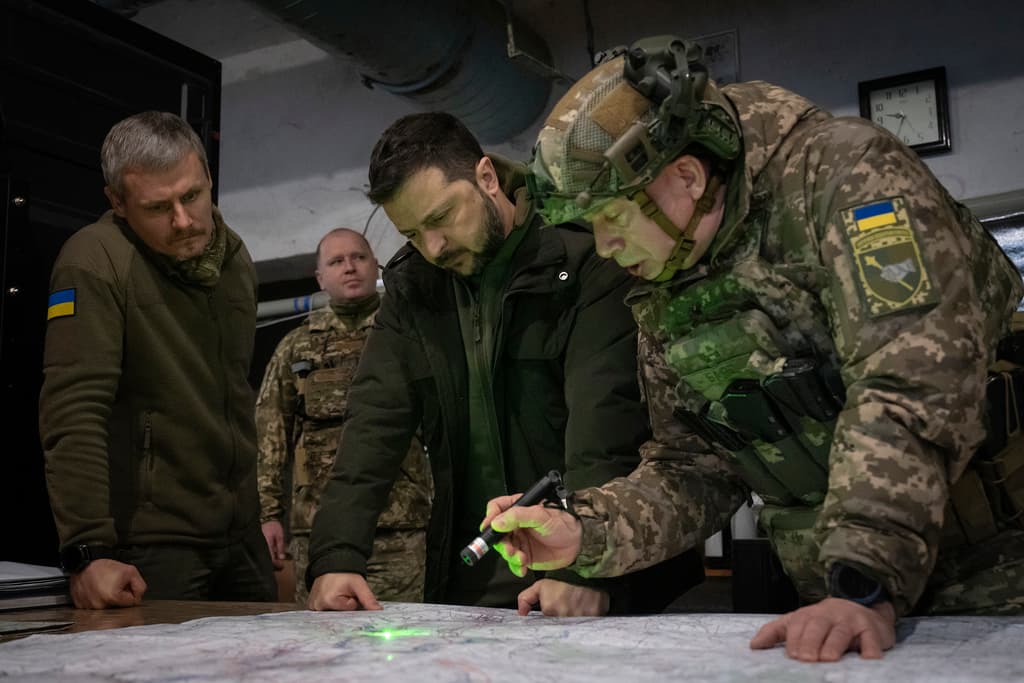‘Winter Is Coming’: Aid to Ukraine Plummets, as Western Democracies Squabble and Russia Re-Arms
‘Given the uncertainty over further U.S. aid,’ one analyst observes, ‘Ukraine can only hope for’ the European Union to come through with support.

With parliamentarians in Washington and Brussels wrangling over Ukraine military aid packages totaling $114 billion, Western pledges to Ukraine are down 87 percent this fall from a year ago. That’s according to new data released to The New York Sun by the Germany-based Kiel Institute. The Institute also reports in a new survey to be released Thursday that this year the EU topped the United States as top provider of heavy weapons to Ukraine
“Our figures confirm the impression of a more hesitant donor attitude in recent months,” says the Institute’s Christoph Trebesch, who heads the Ukraine Support Tracker. “Ukraine is increasingly dependent on a few core donors that continue to deliver substantial support, like Germany, the U.S., or the Nordic countries. Given the uncertainty over further U.S. aid, Ukraine can only hope for the EU to finally pass its long-announced 50 billion euro support package.”
In Congress, a package containing $60 billion in military aid to Ukraine and $14 billion in aid to Israel is being held up as Republicans tie approval to stricter immigration controls at the southern border with Mexico. EU leaders are to meet next week in a two-day summit to vote on 50 billion euros in aid for Ukraine. Hungary’s leader Viktor Orban, an ally of Russia, threatens to veto aid for Ukraine and for Ukraine to start EU membership talks.
Hesitation and political maneuvering in Western democracies contrast with decisive moves by Russia’s autocratic leader, Vladimir Putin. Last week, Mr. Putin signed an increase to boost defense and security spending for next year some 70 percent to $157 billion. He also decreed an increase in Russian forces by 170,000, to 1.3 million soldiers. This beefed up military spending is accompanied by sharpened imperialist rhetoric from the Kremlin.
Russia’s former president, Dmitry Medvedev, wrote last month in an article on Russian-Polish relations that Moscow now has a “dangerous enemy” in Poland. “We will treat it precisely as a historical enemy,” wrote Mr. Medvedev, who is now deputy chairman of Russia’s Security Council. “If there is no hope for reconciliation with the enemy, Russia should have only one and a very tough attitude regarding its fate.”
Mr. Medvedev adds that “history has more than once delivered a merciless verdict to the presumptuous Poles: no matter how ambitious the revanchist plans may be, their collapse could lead to the death of Polish statehood in its entirety.” Similar expansionist rhetoric airs on the TV program of a Kremlin propagandist, Vladimir Solovyov, which boasts a large Russian audience. “The Russian empire is growing back,” crows analyst Stanislav Krapivnik.
“The Baltics will be next,” Mr. Krapivnik adds. “They say, they’re ready for a war with Russia. How long will that take? About 15 minutes.” Hence the seriousness in which the Europeans take such talk. “With its imperial ambitions, Russia represents the greatest and most urgent threat to NATO countries,” reads a new report from Germany. After Ukraine is over, it reckons, “Moscow may need as little as six to ten years to reconstitute its armed forces.”
Within that time, Germany and NATO must enable their armed forces to deter and, if necessary, fight against Russia. Only then will they be in a position to reduce the risk of another war breaking out in Europe.” A Polish professor, Krzysztof Bledowski, writes for Carnegie Europe: “Can Europe afford to let Ukraine fail in its existential struggle? The future cost of maintaining the continent at peace would surely rise dramatically should Ukraine fall.” Mr. Bledowski concludes “it is Europe’s war as much as it is Ukraine’s.”
Diane Francis, writes in a column titled: “Winter is Coming” that “Russia’s continuing threat is why Germany has just committed to a long-term military expansion, involving tens of billions throughout the 2030s.” It also explains, she adds, why President Macron this summer “embarked on France’s biggest military spending increase in a half-century, earmarking nearly $450 billion through the end of the decade.” Britain and Italy, she reports, “are allocating billions more.”
On the Washington side of the trans-Atlantic alliance, both parties are urging a political deal to get Ukraine aid approved before the Congress’ Christmas recess. “Ultimately, if we don’t help the Ukrainians out, ultimately Russia will win,” a former Trump aide, Ambassador John Bolton, said Sunday in a WABC radio interview. “People in the House and the Senate should press Biden harder to develop a winning strategy with Ukraine.”
“Not just preventing Ukraine from losing,” Mr. Bolton adds, “but figure out how Ukraine can win.” President Biden’s national security adviser, Jake Sullivan, warned Monday that “we’re running out of money, and we are nearly out of time.” Mr. Sullivan contended that a “vote against supporting Ukraine is a vote to improve Putin’s strategic position.” Today, President Biden said “We can’t let Putin win,” warning: “If Putin takes Ukraine, he won’t stop there.”
Mr. Putin will attack a NATO ally, Mr. Sullivan predicted, and then “we’ll have American troops fighting Russian troops.” On the border issue, Mr. Biden said he is willing to make “significant” compromises, but stressed: “This has to be a negotiation.” In a post on X on Tuesday, Senator Romney said that Mr. Biden and the Democrats have a choice. “Dems want $106B — GOP wants a closed border. That’s the trade,” he wrote. “Is an open border more important to Dems than Ukraine and Israel?”

